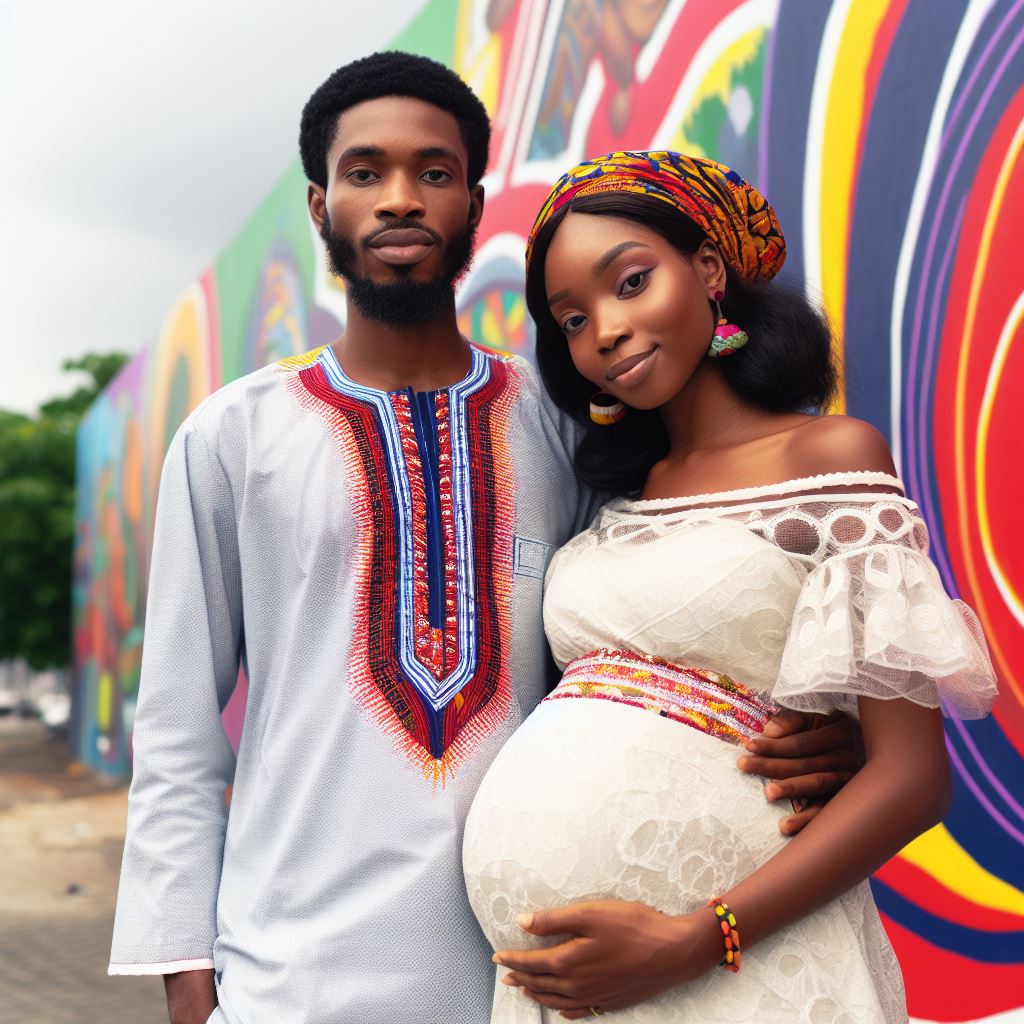Introduction
In this section, we will explore the significance of understanding genotypes and the potential challenges they can pose in relationships among Nigerian couples
The Importance of Genotype Understanding
Understanding genotypes is crucial for Nigerian couples as it impacts their future together.
Genotypes determine the inherited traits and susceptibility to certain genetic disorders.
Challenges Posed by Genotypes in Relationships
- Couples with incompatible genotypes face the risk of passing genetic disorders to their offspring.
- This can lead to emotional turmoil, moral dilemmas, and difficult decisions regarding starting a family.
- Genotype compatibility is an essential aspect that can influence the success and happiness of a relationship.
Now that we have highlighted the significance of understanding genotypes and their potential challenges, let’s delve deeper into individual stories of Nigerian couples who have faced and overcome these struggles.
Read: Exploring the Four Main Blood Groups: A, B, AB, and O
Understanding Genotypes and their Implications
What genotypes are and how they are inherited
- Genotypes refer to the genetic makeup of an individual
- They are inherited from parents and determine various physical and biological traits
- Genotypes are determined by the combination of alleles received from each parent
- Each parent contributes one allele, resulting in the offspring’s genotype
- The inheritance pattern follows Mendelian genetics
Types of genotypes prevalent in Nigeria, including AA, AS, and SS
- In Nigeria, the three main genotypes prevalent are AA, AS, and SS
- AA represents the normal genotype, devoid of any sickle cell alleles
- AS signifies the carrier of the sickle cell trait, with one sickle cell allele
- SS indicates the presence of two sickle cell alleles, causing sickle cell disease
Implications of different genotypes, particularly the challenges faced by couples with the Sickle Cell (SS) genotype
- Couples with the SS genotype face the risk of having children with sickle cell disease
- Sickle cell disease is a serious genetic condition that affects the quality of life
- It causes chronic pain, organ damage, increased susceptibility to infections, and shortened lifespan
- Couples with SS genotype may experience emotional stress, fear, and guilt due to the potential health challenges their children may face
- This genotype can significantly impact family dynamics and financial resources
Need for awareness and proactive measures to address genotype challenges in relationships
- Increasing awareness about genotypes and their implications is crucial
- Education can empower individuals to make informed decisions in choosing partners
- Pre-marital genotype testing enables couples to understand the risks before starting a family
- Awareness campaigns and counseling can help reduce stigma and provide support for couples affected by genotype challenges
- Government policies can promote mandatory genotype testing, genetic counseling, and reproductive options like preimplantation genetic diagnosis and adoption
Read: The Science Behind Genotypes and Blood Groups: A Deep Dive
Real-life Stories of Nigerian Couples with with Genotype Challenges
Personal Stories of Nigerian Couples Facing Genotype Challenges
1. Joy and John: Uncovering Genotype Disparities and Initial Reactions
- In the midst of profound love, Joy and John faced an unexpected revelation about their genotype differences.
- Joy possessed the sickle cell trait (AS), while John carried the burden of sickle cell disease (SS). Their initial response was a mix of shock, fear, and uncertainty.
2. Chinwe and Emeka: Navigating Emotional and Psychological Impact
- Chinwe and Emeka’s whirlwind romance took a challenging turn when genotype differences surfaced. Chinwe had the sickle cell trait (AS), and Emeka bore the weight of sickle cell disease (SS).
- The emotional and psychological toll was overwhelming, prompting deep reflections on their shared future.
3. Aisha and Ali: Conquering Genotype Hurdles and Cultivating Resilient Love
- Aisha and Ali confronted genotype challenges head-on. Aisha carried the sickle cell trait (AS), while Ali grappled with sickle cell disease (SS).
- Undeterred by societal and familial pressures, they chose to defy the odds and build a robust, enduring relationship.
The Importance of Open Communication, Support, and Understanding
In these Nigerian couples’ journeys, open communication played a vital role.
- It allowed Joy and John, Chinwe and Emeka, and Aisha and Ali to express their fears, concerns, and hopes. It also provided a space for their partners to understand and support them through this challenge.
- Open communication enables couples to navigate through difficult decisions, such as whether to have children and the potential risks involved.
- Support from loved ones and healthcare professionals also played a crucial role in reassuring these couples, giving them the strength to face their genotype challenges together.
The Resilience and Determination of Nigerian Couples
Despite the genotype challenges they faced, Nigerian couples showed remarkable resilience and determination.
- They refused to let these challenges define their love and instead focused on finding solutions.
- They educated themselves about the risks, explored options like genetic counseling, and sought medical guidance to make informed decisions.
- Moreover, these couples embraced love with a newfound appreciation. Their love became intertwined with their experiences, making their bond stronger and deeper.
- They learned to cherish every moment, knowing that life’s challenges can be faced together.
The stories of Joy and John, Chinwe and Emeka, and Aisha and Ali are just a glimpse into the lives of Nigerian couples who have faced genotype challenges.
Through their experiences, we learn the significance of open communication, support, and understanding in overcoming such obstacles.
These couples have shown immense resilience and determination, proving that love can triumph over genotype challenges.
They have become a beacon of hope and inspiration for others facing similar hurdles in their relationships. By embracing love and facing these challenges head-on, Nigerian couples remind us that love is a powerful force that can conquer all.
Read: Debunking Myths: Blood Groups and Personality Traits in Nigeria

Approaches to Managing Genotype Challenges in Relationships
Significance of premarital genotype testing and counseling
- Premarital genotype testing and counseling are crucial in identifying potential genetic compatibility issues early on.
- Genotype testing can help couples understand the risks and potential outcomes associated with different genotypes.
- Through counseling, couples can make informed decisions about their future and potential challenges they may face.
Importance of education and awareness campaigns to inform individuals about genotype compatibility
- Education and awareness campaigns are essential in helping individuals understand the importance of genotype compatibility.
- By raising awareness, people can make informed choices when it comes to selecting a partner and planning a family.
- The more individuals are educated, the higher the chances of avoiding genotype-related challenges in relationships.
Role of genetic counseling in helping couples understand the risks and potential outcomes associated with different genotypes
- Genetic counseling plays a crucial role in providing couples with a comprehensive understanding of genotype-related risks.
- Through counseling sessions, couples can receive professional guidance on how to navigate and manage genotype challenges.
- Genetic counselors can help couples assess the likelihood of passing on genetic conditions and explore available options.
Strategies for couples with genotype challenges, such as
1. Adoption and fostering
Couples facing genotype challenges can consider adoption or fostering as a way to build their family.
This allows them to provide a loving home to a child in need while avoiding the risks associated with their own genotypes.
2. Assisted reproductive techniques like in vitro fertilization (IVF) and preimplantation genetic diagnosis (PGD)
Couples can explore assisted reproductive techniques to increase their chances of having healthy children.
IVF and PGD can help identify embryos without genetic disorders before implantation, reducing the risk of passing on genetic conditions.
3. Utilizing donor sperm or eggs
In cases where both partners have incompatible genotypes, utilizing donor sperm or eggs can be a viable option.
This allows couples to have a child who is not genetically linked to either partner, minimizing the risk of genetic disorders.
Importance of support systems and seeking professional help when needed
- Having a strong support system is crucial for couples facing genotype challenges.
- Support from family, friends, and support groups can provide emotional support and guidance through difficult times.
- Seeking professional help, such as therapy or counseling, can also help couples navigate the emotions and challenges associated with genotype compatibility.
- It is important for couples to know that they are not alone and that professional help is available to them.
Read: Steps to Ensure Genotype Compatibility Before Tying the Knot
Conclusion
Recap the importance of embracing love despite genotype challenges in Nigerian couples
Embracing love despite genotype challenges in Nigerian couples is of utmost importance.
Reiterate the significance of awareness, communication, and support in overcoming these challenges
Awareness, communication, and support are crucial in overcoming these challenges.
Encourage readers to share their own stories and experiences in the comments section
Share your own stories and experiences in the comments section to foster empathy and connection.
Resources and contact information for organizations or clinics specializing in genotype counseling and support
Find help and assistance from organizations or clinics specializing in genotype counseling and support.




